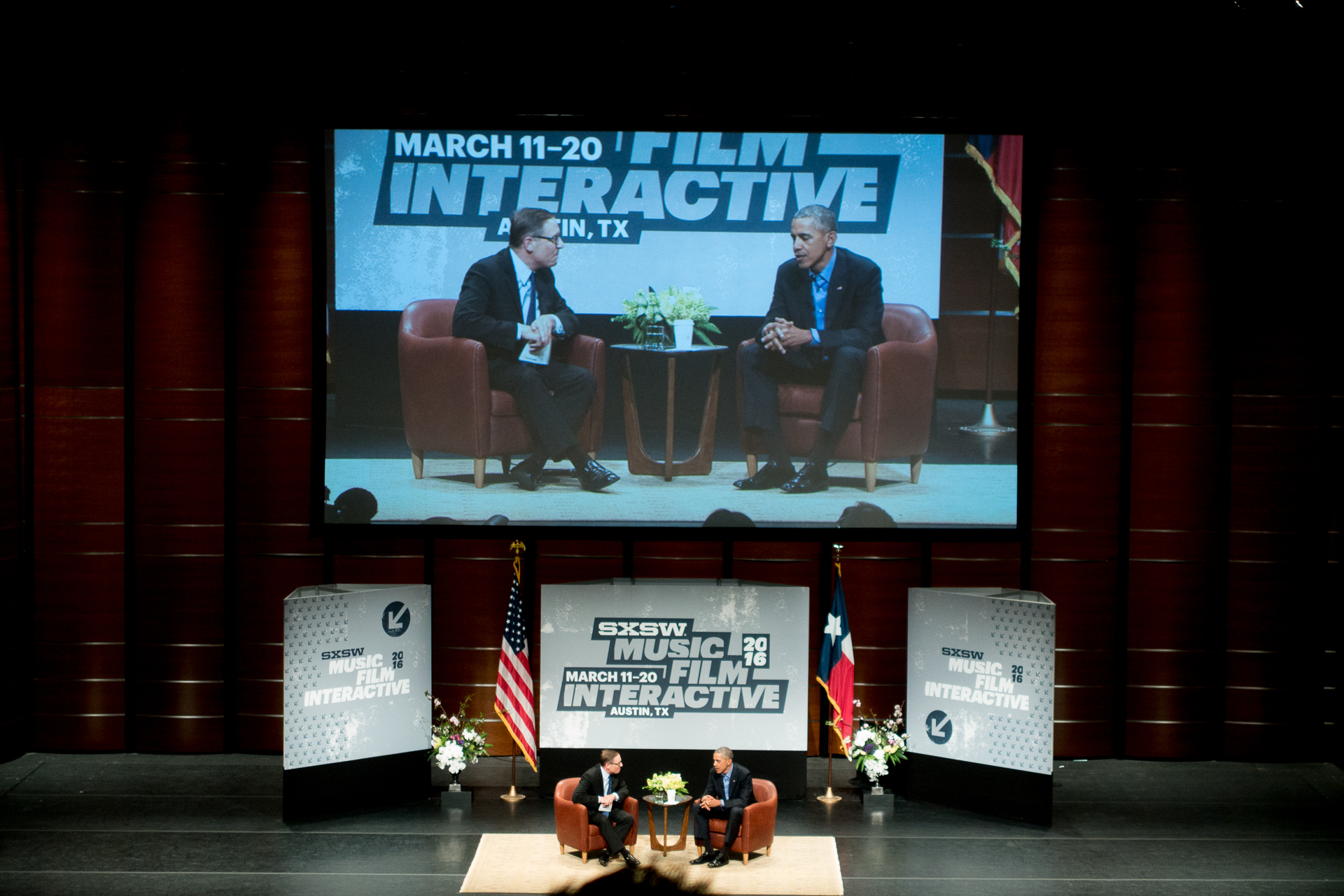This post originally appeared on the site for the Center for Media & Social Impact, School of Communication, American University.
On launch of the 30th SXSW Interactive and Film Festival, using media and tech for the public good was front and center.
Government needs tech.
President Obama used his opening keynote for an ambitious purpose: to bring tech smarts to increasing citizen voice, in a political process that often works to shrink democracy. He challenged the notion, especially marked in among tech innovators, that government is hopelessly inefficient and dysfunctional. The things government does well, he argues, are invisible to users because they work so well, and some things government does are really hard—like educating everyone. Tech innovators, he argued, have an obligation to make government serve, inform and enable action by citizens: Look at what could happen at the DMV, in voting, in social services, if tech helped government and citizens connect more easily.
He also acknowledged poor procurement processes botched the health care website launch, but praised the team of ninja-nerds that fixed it, and pointed to other private-public partnerships working to bring tech smarts into government. Put on the spot about encryption, he asked techies to work with government to find a solution that would let law enforcement into devices on issues that the society agrees threaten us all.
Don’t complain, organize.
Right behind this do-good tech-centered argument was a starkly political one. The President openly acknowledged that citizens are now often shut out of participation and services because powerful politicians don’t want them in. “The reason Texas has such a bad voting record,” he said, “is because the people who run the good state of Texas don’t want those people to vote.” And the only thing that would change that, or other distortions of democracy and dysfunctions of government, he said, was more citizen action.
The President was appealing to the tech innovation elite to enable and encourage citizens to demand and defend democracy, even as it is snatched away from them by powerful interests. Bold. Very bold.
Trapped.
The opening evening featured the already-celebrated documentary “Trapped,” which features Texas characters. The film, by Dawn Porter, tracks several providers of abortion and other reproductive health services in southern states, affected by legislation that harshly limits access to abortion and that now is being challenged in the Supreme Court.
At the opening night screening, the audience gave an ovation to the people featured in the film, who came up on stage, as well as former Texas legislator Wendy Davis. Davis had conducted a filibuster that temporarily blocked one of the pieces of legislation. On stage, she celebrated the courage and dedication of the abortion providers. “You are the heroes,” she said.
Porter talked about the daily dangers that the doctors and provider personnel confront—which the film shared in. “We were careful and discreet,” she said, talking about the challenges of making a documentary under dangerous conditions. “I’m not the one under constant surveillance,” she said. “But when one of the anti-abortion activists tells me they are just expressing their opinion, I say, ‘The difference between us is that when I express my opinion, you’re not afraid of getting shot.’”
Porter launched the film to contribute to public debate on the issue in the season of Supreme Court deliberations. More than a hundred community screenings are being held nationwide, organized through the film’s website, and it is in theaters in major cities.
Panels.
The strand SXgood was full of tips for nonprofits to leverage digital affordances. At the panel “Turning the Tide of Corruption,” presenters featured ways that Mexicans and Guatemalans are using online technology to confront power. Kara Andrade, an American University Ph.D. student, analyzed — drawing on legal scholar Lawrence Lessig — how citizen digital challenges could attack power in four ways that it is organized, including law, code/architecture, markets and norms.

Wendy Davis in 2013. Photo by Alan Kotok on Flickr and used here with Creative Commons license.
A mini-conference on online harassment resulted from an embarrassing kerfuffle in SXSW planning, when the Interactive team temporarily cancelled panels on the topic after Gamergate types threatened violence. After protests, SXSW held an all-day summit that drew lawyers, nonprofit reps, and activists. The well-attended panel on women and media began with startling statistics from Jamia Wilson, who heads Women Action and the Media (and is an AU alum). Some 12 percent of the complaints coming into her organization concern harassment that involves direct threats of violence. This panel also featured Wendy Davis, who talked about the consequences of being labeled “abortion Barbie” online. Soraya Chemaly of Women’s Media Center noted that more women need to be in media, to address implicit bias. Panelists agreed that misogynistic online harassment of women is the tip of a very big iceberg of misogyny.
 This post originally appeared on the the site for the Center for Media & Social Impact, School of Communication, American University.
This post originally appeared on the the site for the Center for Media & Social Impact, School of Communication, American University.
Patricia Aufderheide is University Professor and Director of the Center for Media & Social Impact, School of Communication, American University, and co-author with Peter Jaszi of “Reclaiming Fair Use: How to Put Balance Back in Copyright” (University of Chicago Press). You can give feedback at [email protected].

